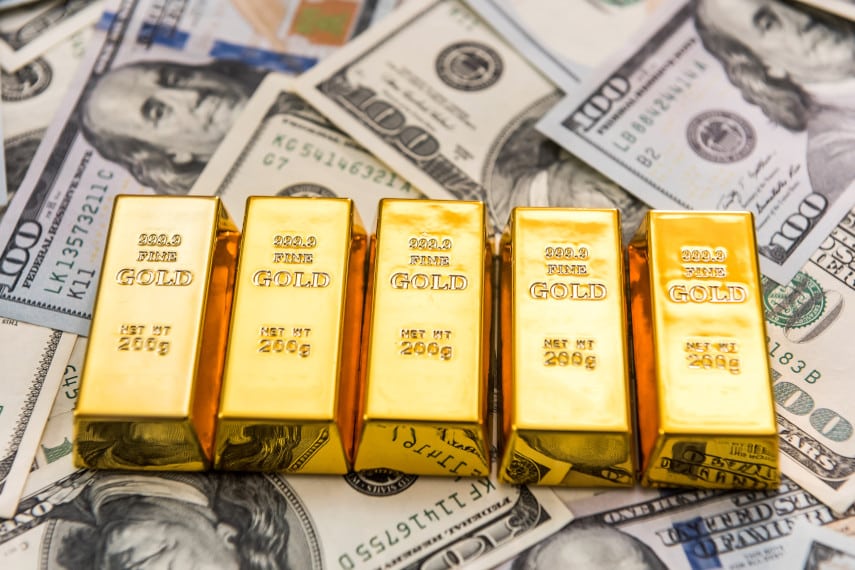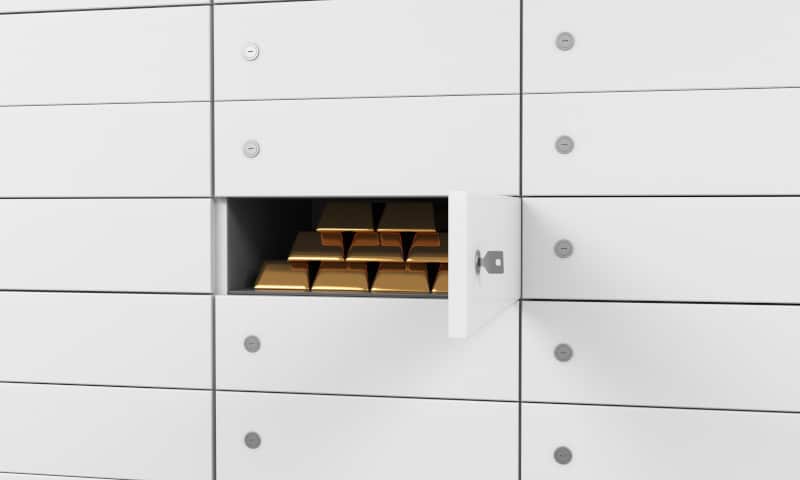3 Easy Steps to Roll Over Your TSP Into an IRA
Over 70 million Americans today have 401(k) accounts, making them one of the most popular types of retirement accounts Federal employees don’t have 401(k) accounts, but instead have the Thrift...
Precious Metals

With the recent unease in financial markets, more and more Americans are looking for safety when it comes to their assets. Many people are starting to worry and are looking for alternatives, one of which is gold.
The gold price has shot up in recent months as more and more people have sought safety in the yellow metal. With the gold price having recently reached record highs of over $3,300 an ounce, could this be the beginning of a significant bull run for gold?
While gold has traditionally been seen as a safe haven asset during times of trouble, could it also play a role as part of a retirement plan? That’s a question that many Americans have, and the more they think about retirement, the more they want to know the answer.

Owning gold can offer numerous potential benefits. Here are four advantages of gold to keep in mind if you’re considering buying gold as part of a retirement plan.
Diversification is one of the major benefits of owning gold. Because gold often does well during periods of recession or financial turmoil, it is often considered to be a countercyclical asset.
That’s why you’ll often see the gold price soar when the economy begins to enter a downturn, because so many people start trying to add gold to their portfolios to get ahead of the market.
Many people think that owning a smattering of stocks and bonds is sufficient diversification. But during times of economic distress, both stock and bonds can fall at the same time.
That’s why many people choose to diversify their portfolios, to spread risk so that losses in one area might be mitigated by other assets within their portfolio.
It’s one thing to own a valuable asset, but it’s another thing to sell it. You may have some valuable baseball cards that you collected when you were a kid, but if you can’t find a buyer for them, what are they really worth?
Thankfully gold doesn’t have that problem. Gold is one of the most liquid assets in the world, gold markets operate around the clock around the globe.
Gold has been considered a safe haven for centuries. Whenever fear or uncertainty present themselves, one of the first assets people look for is gold.
That is the same today as it has been for years, with safe haven buying today helping push the gold price up to new records.
Gold’s ability to maintain its value and purchasing power against inflation has helped make it a much desired asset for those looking to help protect themselves against inflation. Since 1971 the US dollar has lost over 88% of its purchasing power, while the price of gold has risen over 9,000%.
During the stagflation of the 1970s, gold’s annualized growth rate was over 30% per year over the course of the decade, well outpacing inflation that peaked at 13%. Gold owners today would love to see gold repeat that kind of performance if inflation continues rising in the future.

Of course, every asset has its pros and cons. Yes, gold has some great benefits associated with it, but it also has some drawbacks.
If you’re looking at gold as part of your retirement plan, here are two that you’re going to want to think about.
Depending on how much gold you buy and how you buy it, you may end up needing to pay for storage costs. This could range from a few hundred dollars for a home safe to over a hundred dollars a year for storage in a safe deposit box or in a bullion depository.
These storage fees can eat into the returns your gold makes. If you have a large amount of gold and pay a fixed storage fee, that might end up only being a small percentage of your holdings. But if you only have a few thousand dollars in gold and pay hundreds of dollars a year in storage costs, that can add up over time.
Storage fees will depend on where and how you want your gold stored. If you plan to have gold delivered to you at home, you may already have a safe, or you may feel that a hiding place in your home is sufficient.
But if you buy tens or hundreds of thousands of dollars in gold and decide to pay for storage, or if you start a gold IRA and store your gold in a bullion depository, storage costs may be a necessity, and a cost that has to be figured into your plans.
One drawback to gold is that it isn’t a source of income. That doesn’t mean it doesn’t make gains, however, it just means that the gains you make are the result of increases in the gold price.
It’s like the difference between stocks that pay dividends and those that don’t. Companies that don’t pay dividends often want to reinvest all their earnings into the business rather than paying out dividends, so investors who buy those stocks make money only when the stock price goes up.
With dividend-paying stocks, however, investors get paid dividends on a regular basis, so they’re making money even if the stock price goes down. Because gold doesn’t pay dividends, you don’t get the benefit of any extra dividend income.
That’s not necessarily a negative thing, however, as gold’s long-term price growth over the decades has been pretty good. But it’s just one thing to keep in mind, and a common argument you’ll hear from commentators who may want to belittle gold.

One of the common questions newcomers to gold ask is, how do I buy gold?
Well, there are a lot more options available today than just going down to your local coin shop and picking up some gold coins. And some of the options available could mesh very well with your retirement planning.
One popular option for buying gold is through a gold IRA. A gold IRA is just an IRA account that owns and holds physical gold coins or bars. Those gold assets are managed by an IRA custodian and held in a bullion depository.
You can fund a gold IRA with a tax-free transfer or rollover of funds from existing retirement accounts such as a 401(k), 403(b), TSP, IRA, or similar account. This allows you to help safeguard your existing retirement savings with gold without having to pay taxes or penalties.
A gold IRA is subject to all the same rules and regulations as other IRA accounts, including those pertaining to distributions. When you take a distribution from your gold IRA, you can choose to take it in cash or in physical gold.
If you prefer not to use your retirement savings to fund a gold IRA, or if you prefer to store your gold at home, there’s always the option of a direct cash purchase of gold. Goldco offers a variety of gold coins from mints around the world, bringing you authentic gold coins directly from their manufacturers.
One thing you’ll need to be aware of is that gold held outside an IRA can be taxed differently than gold held in a gold IRA. These tax issues are something you’ll want to consider if gold become part of your retirement planning, and are something you should discuss with your tax advisor.
Some people prefer to buy shares in gold exchange-traded funds (ETFs). These offer exposure to the gold price through shares of funds that own gold. But there are numerous drawbacks to gold ETFs, and those shares can’t be converted into actual physical gold.
For people who want to own gold because it’s a physical, tangible asset that they can put their hands on, gold ETFs may not be the ultimate solution.
As with any other asset you consider for retirement planning purposes, gold has advantages and disadvantages. Whether or not gold is the right fit for your purposes will depend on numerous factors that you’ll have to take into consideration when determining if buying gold is a good retirement plan option for you.
You may want to consult with your tax advisor or financial advisor to discuss how precious metals might fit in to a comprehensive diversified retirement strategy.
The first thing you’ll want to consider is your financial situation. How much money are you bringing in each month? How much are you spending? How much debt do you have?
These are all basic questions you should ask yourself and/or discuss with a financial advisor or retirement planner before making any financial decisions that could impact your retirement.
Sure, you may want to safeguard your finances, but if you’re struggling to make ends meet or have student loans, car loans, or other debt you need to pay off, will buying gold really help you?
If you’re in a better financial position, with a steady income, a disciplined budget, and plenty of savings, you might be in a better position to think about buying gold. But remember that gold, despite its long-term rise in price, isn’t guaranteed to always go up in price.
Your goals may change over time as you grow older, build a family, buy a house, etc. What you may think is a good retirement plan at age 25 may be completely different by age 35, and then again by age 45.
As you progress in your career you’ll be exposed to new information, you’ll have access to new means of saving, and you’ll discover things that you wished you had known earlier. We all come to the table with limited information, and we all strive to increase the amount of knowledge we have as we grow closer to retirement.
In general, the younger you are the more aggressive your wealth strategy may be, and the older you are the more you’ll focus on maintaining your existing wealth rather than gaining new wealth. Gold can play a role in both of those strategies, but the size, type, and method of gold you buy might differ.
Your age and state in life also determine your retirement planning horizon. If you’re in your 30s and have 30+ years to retirement, that means you probably have at 45-50 more years to live. That’s a very long time horizon, with a large number of years of earning and saving potential ahead of you.
On the other hand, if you’re 60, you’re probably nearing retirement and only have about 5 years of work income ahead of you. The next 15-20 years after that are going to be funded by the savings you’ve accumulated already.
The younger you are, the more you can afford to ride out periodic recessions and financial crises, because you have time on your side. The older you are, the more devastating a potential financial panic could be to your financial health.
During the 2008 financial crisis markets lost more than 50% of their value. If that were to happen, could you afford to sustain those kinds of losses today?
Taking a look at your situation and your time horizon could determine what role gold could play in your retirement plan.
Goldco has helped thousands of customers benefit from owning gold, and we’ve made over $3 billion in precious metals placements. We work directly with mints to get you the gold you want, and our over 6,000 5-star reviews speak to the efforts we go through to make sure that our customers are satisfied.
If you’ve been working hard for years to build up your retirement savings, now is the time to start thinking about how you can help safeguard them. Call Goldco today to learn more about how you can make gold a part of your retirement plan.
This article was originally published in March 2023 and was updated in May 2025.

